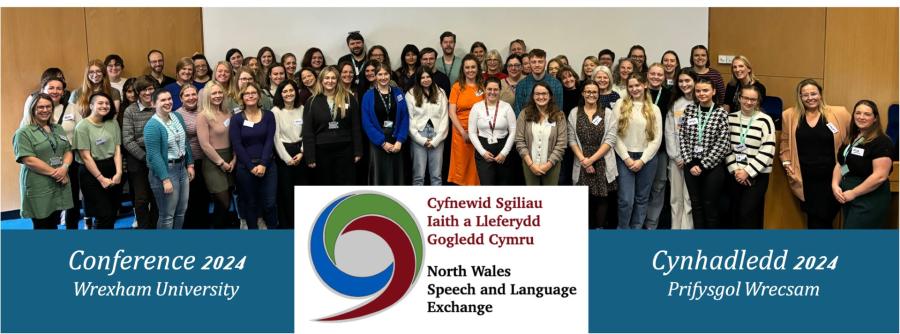Knowledge exchange between language researchers and speech and language therapists
Jazmine Beauchamp is a 2nd year PhD researcher, investigating the availability and adequacy of Welsh language resources for speech and language therapists (SLTs).
The 2nd annual conference of the North Wales Speech and Language Exchange (NWSLE) took place in Wrexham University on the 9th of October, in partnership with the Betsi Cadwaladr University Health Board (BCUHB) and Bangor University. I received an invitation to present my research on the experiences of Speech and Language Therapists (SLTs) in Wales. This was a great opportunity to present at a local conference and network with the Speech and Language Therapy community of North Wales.
The theme of the conference was ‘Getting started in research and innovation’, with speakers from organisations such as the Royal College of Speech and Language Therapy (RCSLT), Betsi Cadwaladr University Health Board (BCUHB) and Community for Allied Health Professions Research (CAHPR) Cymru. These talks were an exciting opportunity to bring together researchers who study language development, and the clinicians who put that research into practice.
The keynote speaker Emma Louise Sinnot, a Clinical Academic, highlighted the importance of SLTs conducting research as they are often the first to see the gaps in the research. However, the general consensus from the clinicians was that their caseloads are far too busy for them to be able to conduct research too. Therefore, we discussed the importance of clinicians working with academics to ensure that researchers understand where more research is needed.
My presentation was held during the ‘lightning talks’ in the afternoon. I briefly spoke about my research before asking the SLTs present to respond to my survey. My presentation and survey sparked conversations on the notable lack of Welsh resources available for SLTs to use in their work. We had a very helpful discussion on what Welsh language resources are needed for these clinicians to provide effective support to their bilingual clients.
Overall, the NWSLE was a success in gathering the Speech and Language community of North Wales to discuss the current research, as well as what is needed from future research.

